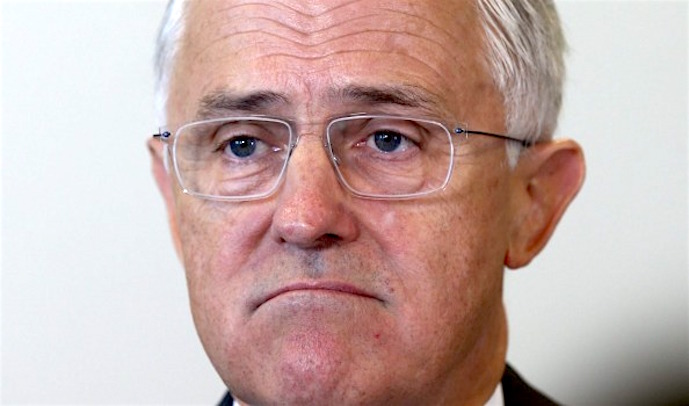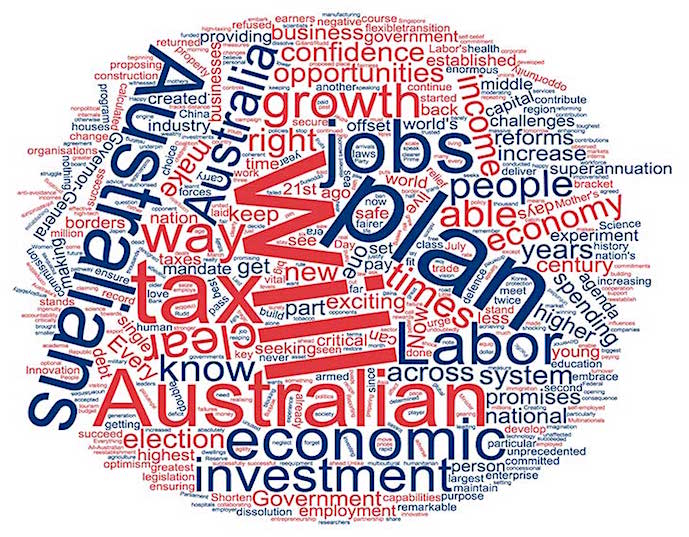-
20/07/2016
-
Ad astra
-
actions

It was one of
The Political Sword’s regular contributors, Casablanca, who drew my attention to the absence of a verb in the Coalition’s prime slogan ‘Jobs and Growth’. She had been alerted by an article in
The Guardian by Van Badham in May:
Good slogan, Malcolm Turnbull, but growth in what kind of jobs?
The absence of verbs is diagnostic of the malaise that afflicts PM Turnbull, Treasurer Morrison, Finance Minister Cormann and most of the Coalition ministry.
Casablanca reminds us that we learned that verbs are 'doing' words when we were kids in Primary School. Yet here we are in 2016 finding that it is the intention to do something, to take action, that is missing from the centerpiece of the Coalition’s election strategy, its much-vaunted ‘economic plan’ for 'Jobs and Growth'; indeed it is missing from many of the Turnbull government’s so-called ‘plans’.
While it repeated
ad nauseam its three word ‘Jobs and Growth’ mantra, it avoided saying how it would achieve this ethereal aspiration. We were left to deduce that somehow giving a tax cut to business would magically stimulate investment, expand business activity, improve productivity, create jobs, and increase wages. It was left to Arthur Sinodinos to confidently assure us that workers would be the main beneficiaries of a tax break for business – good old trickle down all over again! It seems the electorate did not give that assurance much credence; nor did it believe the insistent declarations about Jobs and Growth that emanated from Turnbull, Morrison and Cormann. No less than Victorian Liberal powerbroker Michael Kroger castigated Turnbull and Morrison for selling the ‘Jobs and Growth’ story so poorly; in truth the slogan was never saleable as it had no substance, it had no verb.
Whatever else we thought of the calamitous Tony Abbott, we have to acknowledge that his three-word slogans at least had verbs: ‘Stop the Boats’, ‘Axe the Tax’, ‘Stop the Waste’ and ‘Repay the debt’. We could see his intentions, even if we disagreed with them. The intentions of Turnbull
et al are vague, lacking in action words,
sans verbs.
Now that he has his majority, we will see how he intends to action his promises.
Writing in
The Sydney Morning Herald in an article titled:
Federal election 2016: Malcolm Turnbull is a man with no plan, just a lot of flimflam, economics writer Ross Gittins said:
“Malcolm Turnbull went to the election offering a "national plan for jobs and growth" that was supposed to secure our future. Trouble is, it now looks unlikely he'll be able to implement the centrepiece of that plan, the phased reduction over 10 years of the rate of company tax, from 30 per cent to 25 per cent.
“Unsurprisingly, the proposed cut in company tax did not impress the voters, who think companies are paying too little tax, not too much. Labor opposed the cut, save for the immediate reduction to 27.5 per cent for genuinely small business.
“With the government now facing an even more hostile Senate, it's unlikely Turnbull will get any more than that.
“This would be no great loss in the quest for jobs and growth. The government's own modelling suggested the tax cut would do virtually nothing to create jobs, and the boost to growth in Australians' incomes would be tiny and come only after a decade or three.”
So ‘Jobs and Growth’ not only had no verb, it had no substance. Asked what ‘the plan’ was to achieve ‘Jobs and Growth’, the stock answer was: “The plan is the Budget”. The people saw through this answer, picked it as a fraud, an attempt to deceive. It nearly lost Turnbull the election.
What is this aversion to using verbs, to stating what action will be taken, to saying how promises will be kept?
Gittins continued:
“But what about the other parts of Turnbull's ‘five-point plan’? It's a muddle of things that will be done, things already done and…what the plan will achieve.”
Apart from the planned company tax cut, Gittins mentioned
"an innovation and science program bringing Australian ideas to market" that’s already done with benefits likely to be modest;
"a new defence industry plan that will secure an advanced defence manufacturing industry in Australia"…a highly protectionist and costly way of buying votes in South Australia, of debatable defence value;
"export trade deals that will generate more than 19,000 export opportunities", which refers to preferential trade deals already made with Japan, Korea and China, which Gittins’ colleague Peter Martin demonstrated usually add more to our imports than our exports; and
"a strong new economy with more than 200,000 jobs to be created in 2016-17", based on Treasury's budget forecasts for growth in employment, but few of those extra jobs would have been ‘created’ by anything the government did.
Gittins continued:
“Get it? The "plan for jobs and growth" is a (now-thwarted) plan to cut company tax, plus a lot of packaging. That is, Malcolm Turnbull has no plan.
“And, as we've been reminded by noises coming from one of the credit rating agencies, nor does he have a plan to get the government's budget back to surplus anytime soon.”
In his
election announcement speech, Turnbull used the words 'plan' and 'tax' 21 times, 'jobs' 14 times, 'economic' 11 times and 'investment' 10 times. There was no mention of climate change. Verbs were sparse; the predominant one by far was ‘will’.
Take a look at his May 8 ‘word cloud'.

Isn’t it laughable that as the long election campaign progressed, the focal point in his platform: ‘Jobs and Growth’ became the object of derision among journalists and commentators, some of whom mockingly personified it as: ‘Mr Jobson Grothe’.
Malcolm Turnbull turns out to be a man without verbs. He has nouns, plenty of adjectives: ‘nimble’, ‘agile’, ‘innovative’, and ‘exciting’, and an abundance of stock phrases that he, Morrison and Cormann spout whenever they get a chance, as portrayed in
The tale of two Daleks.
How will he proceed with his bare minimum of seats in the House and a likely uncooperative, or even hostile Senate?
His spurious
raison d'être for calling a double dissolution election: the desire to reinstate the Australian Building and Construction Commission, if necessary at a joint sitting of both Houses, seems doomed to failure. His exaggerated rhetoric about the imperative of cleansing the CFMEU and other construction unions of corruption and strong-arm behaviour has lost its zing. Nobody is listening any more. Even the Coalition-leaning Bob Katter has warned that he will not vote for what he terms ‘union-bashing’ legislation. With his slim majority in the House and the lack of a majority in the Senate, how can Turnbull muster the votes he needs? The one occasion where his intended action was spelt out, looks like being a non-event. He might have had a verb in mind, but an adjective – ‘impossible’ – will likely operate to thwart him.
How will he get his company tax cuts through the Senate? Even without the cross benches, it is likely that Labor and the Greens will not approve his full package. The best he can anticipate is a tax cut for genuinely small businesses, which Labor seems inclined to support. That will help small business, but will do nothing much for ‘Jobs and Growth’.
Except among Coalition members there is negligible support for giving the tax avoiders, the big banks and the multinationals still more tax relief. What is likely is substantial support for a Royal Commission into Banking, which will put intense pressure on Turnbull’s slender majority. The verb ‘oppose’ will be in his mind, but he might be forced to consider some nouns: compromise, conciliation, negotiation, concession, and cooperation. On top of this comes the revelation that four of our most prominent accounting firms are complicit in tax avoidance, advising big business and multinationals how to avoid paying their fair share of tax. Will there be a move to include them in the banking inquiry. What verb will Turnbull use to block that?
How will Turnbull handle the marriage equality plebiscite? If Labor or the Greens put forward legislation for a parliamentary vote, will he be able to muster his troops to oppose, or will he give way and compromise. He has to choose between a verb and a noun.
His distaste for verbs may leave him dangling indecisively, just as he has been for months now.
The behaviours that voters seek in those they elect are honesty, openness, transparency, lucid and appealing plans for advancing our nation and its citizens, decisiveness in implementation, and fidelity in keeping promises.
Voters want action, verbs that they understand, plans that have substance and 'doing' words, and nouns that indicate collaboration with other parties and cooperation that will bring benefits to us all, not just the top end of town.
Voters are tired of waffle, empty nouns, implausible adjectives, deceptive platitudes, a paucity of verbs, indecisiveness, dishonesty, self-interest and special pleading by rent-seekers. They want honest actions that lead to equitable outcomes for all of us.
Verbs are important Mr Turnbull. Verbs tell us that you intend to act - that you are going to do something. Where are your policy verbs Prime Minister?
Current rating: 0.4 / 5 | Rated 14 times